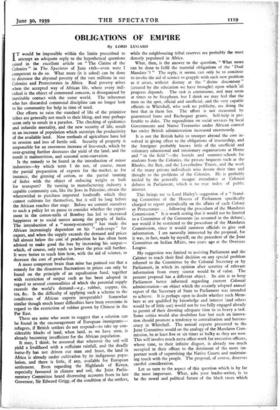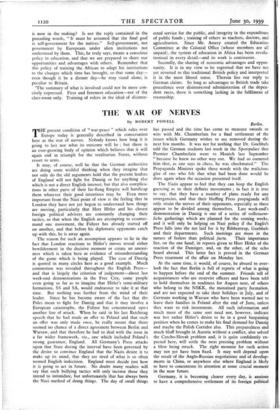OBLIGATIONS OF EMPIRE
By LORD LUGARD
I T would be impossible within the limits prescribed to attempt an adequate reply to the hypothetical questions raised in the excellent article on " The Claims of the Colonies " in The Spectator of June 16th—even were I competent to do so. What more (it is asked) can be done to decrease the abysmal poverty of the vast millions in our Colonies and Protectorates in Africa. Real poverty arises when the accepted way of African life, where every indi- vidual is the object of communal concern, is disorganised by inevitable contact with the outer world. The tribesman who has discarded communal discipline can no longer look to his community for help in time of need.
Our efforts to raise the standard of life of the primitive tribes are generally not much to their liking, and may perhaps seem only to result in a paradox. The checking of epidemics and infantile mortality, and the new security of life, result in an increase of population which outstrips the productivity of the available land. New methods of agriculture have led to erosion and loss of fertile soil. Security of property is responsible for an enormous increase of live-stock, which by over-grazing further decreases the yield of the land, and the result is malnutrition, and seasonal semi-starvation.
Is the remedy to be found in the introduction of minor industries—by which term I do not, of course, mean the partial preparation of exports for the market, as for instance, the ginning of cotton, or the partial tanning of hides with the object of reducing weight or bulk for transport? By turning to manufacturing industry a capable community can, like the Jews in Palestine, obtain the wherewithal to purchase imported foodstuffs which they cannot cultivate for themselves, but it will be long before the African reaches that stage. Before we commit ourselves to such a policy let us pause to consider whether the experi- ment in the cotton-mills of Bombay has led to increased happiness or to social unrest among the people of India. The introduction of a " money-economy " has made the African increasingly dependent on his " cash-crops" for export, and when the supply exceeds the demand and prices fall almost below the cost * of production he has often been advised to make good the loss by increasing his output— which, of course, only tends to lower the price still further. It were better to teach him how, with the aid of science, to decrease the cost of production.
A more competent brain than mine has pointed out that a remedy for the disastrous fluctuations in prices can only be found on the principle of an equalisation fund, together with restriction of output such as has been adopted in regard to several commodities of which the potential supply exceeds the world's demand—e.g., rubber, copper, tin, tea, &c. Is the difficulty of applying such a scheme to the conditions of African exports insuperable? Somewhat similar though much lesser difficulties have been overcome in regard to the restriction of rubber grown by Chinese in the Far East.
There are some who seem to suggest that a solution can be found in the encouragement of European immigrants— refugees, if British settlers do not respond—to take up con- siderable blocks of land, when land, as we have seen, is already becoming insufficient for the African population. It may, I think, be assumed that wherever the soil will yield a livelihood with a sufficient rainfall, and the deadly tsetse-fly has not driven out man and beast, the land in Africa is already under cultivation by its indigenous popu- lation, and there is little, if any, available for European settlement. Even regarding the Highlands of Kenya, especially favoured in climate and soil, the Joint Parlia- mentary Committee heard distressing accounts from its late Governor, Sir Edward Grigg, of the condition of the settlers, while the neighbouring tribal reserves are probably the most densely populated in Africa.
What, then, is the answer to the question, " What more can be done to fulfil the material obligations of the ' Dual Mandate '? " The reply, it seems, can only be to continue to invoke the aid of science to grapple with each new problem as it arises, without dismay at the " divine discontent " (created by the education we have brought) upon which all progress depends. The task is continuous, and may seem at times to be Sisyphean, but I think we may feel that the men on the spot, official and unofficial, and the very capable officials in Whitehall, who seek no publicity, are doing the best that in them lies. The effort is not measured by guaranteed loans and Exchequer grants. Self-help is pre- ferable to doles. The expenditure on social services by local Governments and Native Treasuries under African control has under British administration increased enormously.
It is not the British habit to trumpet abroad the cost in- volved in giving effect to the obligations of trusteeship, and the foreigner probably knows little of the unofficial and voluntary educational and missionary organisations at Home and " in the field "—the hostels and summer-schools for students from the Colonies, the private bequests such as the Rhodes, the Beit, and the Leverhulme Trusts, and the work of the many private individuals who devote their time and thought to the problems of the Colonies. He is probably misled by the generally meagre attendance at Colonial debates in Parliament, which is no true index of public interest.
This brings me to Lord Hailey's suggestion of a " Stand- ing Committee of the Houses of Parliament specifically charged to report periodically on the affairs of each Colony or Protectorate . . . following the procedure of the Mandates Commission." It is worth noting that it would not be limited to a Committee of the Commons (as assumed in the debate), nor would it be restricted to the procedure of the Mandates Commission, since it would summon officials to give oral information. I am naturally interested by the proposal, for it was, in fact, made by myself, on the precedent of the Joint Committee on Indian Affairs, two years ago at the Overseas League.
My suggestion was limited to assisting Parliament and the Cabinet to reach their final decision on any special problem referred to the Committee by the Colonial Secretary or by Parliament, in which its opinion after scrutiny of relevant information from every source would be of value. The present proposal has a different object. Its aim is to keep Parliament better informed regarding current Colonial administration—an object which the recently adopted annual report of the Secretary of State to Parliament was intended to achieve. It is perhaps open to doubt whether such Mem- bers as are qualified by knowledge and interest (and others would be of little use) would not be too fully engaged already to permit of their devoting adequate time to so heavy a task. Some critics would also doubtless fear lest such an innova- tion should promote a tendency to centralisation and bureau- cracy in Whitehall. The annual reports presented to the joint Committee would on the analogy of the Mandates Com- mission, be at least five or six times as bulky as they are now. This will involve much extra office-work for executive officers, whose time, to their infinite disgust, is already too much occupied in their offices to the detriment of the more im- portant work of supervising the Native Courts and maintain- ing touch with the people. The proposal, of course, deserves careful consideration.
Let us turn to the aspect of this question which is by far the most important. What, asks your leader-writer, is to be the moral and political future of the black races which is now in the making? Is not the reply contained in the preceding words, " It must be assumed that the final goal is self-government for the natives." Self-government, not government by Europeans under alien institutions not understood by them. This, he truly says, means a conscious policy in education, and that we are prepared to share our opportunities and advantages with others. Remember that this policy of training the African to adapt his institutions to the changes which time has brought, so that some day— even though it be a distant day—he may stand alone, is peculiar to Britain.
The summary of what is involved could not be more con- cisely expressed. First and foremost education—not of the class-room only. Training of rulers in the ideal of disinter- ested service for the public, and integrity in the expenditure of public funds ; training of others as teachers, doctors, and agriculturists. Since Mr. Amery created the Education Committee at the Colonial Office (whose members are all unpaid), the system of education in Africa has been revolu- tionised in every detail—and its work is continuous.
Secondly, the sharing of economic advantages and oppor- tunity. It is in my view to be regretted that we have not yet reverted to this traditional British policy and interpreted it in the most liberal sense. Therein lies our reply to German claims. So long as advantages to British trade take precedence over disinterested administration of the depen- dent races, there is something lacking in the fulfilment of trusteeship.











































 Previous page
Previous page